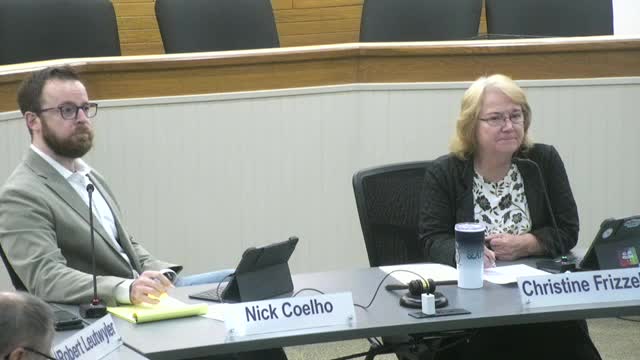Lynnwood staff propose $525,000 initial opioid-abatement spending round, solicit community proposals
October 20, 2025 | Lynnwood, Snohomish County, Washington
This article was created by AI summarizing key points discussed. AI makes mistakes, so for full details and context, please refer to the video of the full meeting. Please report any errors so we can fix them. Report an error »

City staff asked the Lynnwood City Council on Oct. 20 to authorize an initial allocation of opioid-abatement settlement funds and to approve a grant-making process to distribute the money to local providers and internal programs.
Julie Moore, Assistant City Administrator, and Kyle Ward, Human Services Coordinator, presented a spending plan that staff said follows the 1 Washington memorandum of understanding (MOU) and the local opioid abatement council (OAC) requirements. "When Lynnwood signed on to the 1 Washington opioid settlement, we agreed to spend the funds within the allowable uses set within the MOU and to continue receiving payouts from the settlement," Ward said.
Staff proposed authorizing $525,000 from the city's opioid fund: $500,000 for contracts with local providers, to be awarded through a Notice of Funding Opportunity (NOFO), and $25,000 to help cover contract administration (a partial offset to the Human Services Coordinator's salary while he administers the program). Contracts would run for two-year periods, with a cap of five awards per cycle and a maximum per award of $250,000 (staff said the cap was a starting guardrail, not a fixed limit).
Ward outlined a proposed process: release a NOFO; receive applications through the city procurement portal; the city's opioid abatement task group (staff, a council liaison and community representatives) would score proposals and interview finalists; staff would bring recommended contracts to council for final approval and then administer contracts and reporting. Ward said the city already has web-based outreach material and a human-services webpage with background information and a comment channel.
Councilmembers praised the plan's clarity and community-engagement elements and volunteered to serve in oversight roles. Council member Escamilla offered to serve as the council liaison; Council member Decker urged staff to reserve recurring funding to sustain the Lynnwood Police Department's current "scout" social worker, which is funded this year from opioid and other sources (about $42,000) and is shared with neighboring jurisdictions; staff said requests for ongoing internal program funding could be brought back to the task group and to council for budget action.
Ward said Lynnwood has about $920,000 remaining in the opioid settlement balance after prior allocations and that expected annual receipts average about $186,000 and may increase as additional settlements are signed. The city has already dedicated money for a shared social worker and other programs; pending council direction, the NOFO would be issued with the goal of scoring and selecting applicants by February and executing contracts by March.
Julie Moore, Assistant City Administrator, and Kyle Ward, Human Services Coordinator, presented a spending plan that staff said follows the 1 Washington memorandum of understanding (MOU) and the local opioid abatement council (OAC) requirements. "When Lynnwood signed on to the 1 Washington opioid settlement, we agreed to spend the funds within the allowable uses set within the MOU and to continue receiving payouts from the settlement," Ward said.
Staff proposed authorizing $525,000 from the city's opioid fund: $500,000 for contracts with local providers, to be awarded through a Notice of Funding Opportunity (NOFO), and $25,000 to help cover contract administration (a partial offset to the Human Services Coordinator's salary while he administers the program). Contracts would run for two-year periods, with a cap of five awards per cycle and a maximum per award of $250,000 (staff said the cap was a starting guardrail, not a fixed limit).
Ward outlined a proposed process: release a NOFO; receive applications through the city procurement portal; the city's opioid abatement task group (staff, a council liaison and community representatives) would score proposals and interview finalists; staff would bring recommended contracts to council for final approval and then administer contracts and reporting. Ward said the city already has web-based outreach material and a human-services webpage with background information and a comment channel.
Councilmembers praised the plan's clarity and community-engagement elements and volunteered to serve in oversight roles. Council member Escamilla offered to serve as the council liaison; Council member Decker urged staff to reserve recurring funding to sustain the Lynnwood Police Department's current "scout" social worker, which is funded this year from opioid and other sources (about $42,000) and is shared with neighboring jurisdictions; staff said requests for ongoing internal program funding could be brought back to the task group and to council for budget action.
Ward said Lynnwood has about $920,000 remaining in the opioid settlement balance after prior allocations and that expected annual receipts average about $186,000 and may increase as additional settlements are signed. The city has already dedicated money for a shared social worker and other programs; pending council direction, the NOFO would be issued with the goal of scoring and selecting applicants by February and executing contracts by March.
View full meeting
This article is based on a recent meeting—watch the full video and explore the complete transcript for deeper insights into the discussion.
View full meeting
